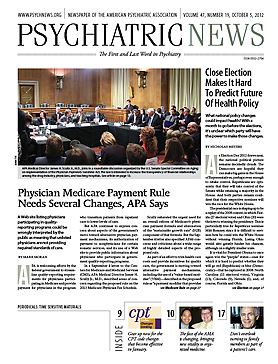Lilly Halts Trials of Pomaglumetad Methionil
Eli Lilly has announced that it is halting clinical studies investigating pomaglumetad methionil , also known as mGlu2/3, for treatment of patients with schizophrenia. The decision was made after a recently conducted independent futility analysis concluded that HBBN, the second of Lilly’s two pivotal studies, was unlikely to be positive in its primary efficacy endpoint if enrolled to completion. The decision was not based on safety concerns. Additionally, the recently completed phase 2 study, HBCO, which investigated pomaglumetad methionil as an adjunctive treatment with atypical antipsychotics, did not meet its primary endpoint.
Lilly said it is contacting study investigators to outline specific actions related to the closeout of each ongoing study and will work with investigators to ensure appropriate transition of study participants to clinical care outside of the trials.
Generic Ziprasidone Available Soon
Wockhardt has received tentative Food and Drug Administration (FDA) approval to market a generic version of 20 mg, 40 mg, 60 mg, and 80 mg capsules containing ziprasidone hydrochloride , used to treat bipolar disorders and schizophrenia, and marketed in the United States as Geodon by Pfizer.
Wockhardt said it will manufacture the ziprasidone at facilities in India.
Mylan to Offer Generic Modafinil, Lithium Carbonate
Mylan has announced that it has received FDA approval for a 450 mg extended-release lithium carbonate tablet , a generic version of Noven’s Lithobid tablets, indicated for treatment of manic episodes of bipolar disorder and as a maintenance treatment for individuals with bipolar disorder.
Mylan announced August 10 that it received final FDA approval for its 100 mg and 200 mg modafinil tablets . The product is the generic version of Cephalon’s Provigil and improves wakefulness in adults with excessive sleepiness associated with narcolepsy, obstructive sleep apnea, or shift-work disorder. Mylan reminded practitioners in the announcement that modafinil has been associated with serious rashes requiring hospitalization and hypersensitivity reactions and that it is not approved for use in pediatric patients for any indication.
Solanezumab Fails to Meet Endpoints
On August 24, Eli Lilly announced that the primary endpoints, both cognitive and functional, were not met in either of the two phase 3, double-blind, placebo-controlled Effect of Solanezumab on the Progression of Alzheimer’s Disease (EXPEDITION) trials in patients with mild-to-moderate Alzheimer’s disease (AD). However, a prespecified secondary analysis of pooled data from both trials showed statistically significant slowing of cognitive decline in the study population of patients with mild-to-moderate AD.
Adverse events with an incidence of at least 1 percent that occurred statistically significantly more in the solanezumab group than in the placebo group were lethargy, rash, and malaise (in EXPEDITION1) and angina (in EXPEDITION2).
An ongoing, open-label extension study, EXPEDITION-EXT, is fully enrolled and will continue as planned. John Lechleiter, Ph.D., chair and chief executive officer of Lilly, said the company intends to discuss its data with regulatory authorities to gain insights on potential next steps.
Tolerability of Avagacestat Determined for AD Studies
Researchers have long thought that inhibiting γ-secretase may decrease production of amyloid and potentially modify disease progression in AD. One group has recently evaluated the safety and tolerability of the γ-secretase inhibitor avagacestat in a phase 2 study of mild-to-moderate AD. According to results published online August 13 in the Archives of Neurology, avagacestat dosed at 25 mg and 50 mg daily was well tolerated and had low discontinuation rates, while doses of 100 mg and 125 mg were poorly tolerated, with trends for cognitive worsening.
“Exploratory cerebrospinal fluid biomarker substudies provide preliminary support for γ-secretase target engagement, but additional studies are warranted to better characterize pharmacodynamics effects at the 25-and 50-mg doses,” wrote the researchers, who said their study established an acceptable safety and tolerability dose range for future avagacestat studies in AD.
The study was funded by Bristol-Myers Squibb.
FDA Approves Higher-Dose Rivastigmine Patch
The FDA has approved a higher dose of Exelon Patch ( rivastigmine transdermal system , manufactured by Novartis) for treatment of mild-to-moderate AD. The manufacturer says the new 13.3 mg/24 h dosage strength of Exelon Patch provides physicians with a treatment option for patients who are experiencing a decline in overall function and cognition.
Approval of Exelon Patch 13.3 mg/24 h was based on the 48-week double-blind phase of the Comparative Efficacy, Safety, and Tolerability of Rivastigmine 10 and 15 cm
2 Patch in Patients With Alzheimer’s Disease Showing Cognitive Decline (OPTIMA) study, a controlled trial in patients with mild-to-moderate AD who met predefined criteria for functional and cognitive decline on the 9.5 mg/24 h dose. Patients treated with the 13.3 mg/24 h patch experienced statistically significant improvement in overall function compared with the 9.5 mg/24 h patch as measured by the Instrumental Activities of Daily Living Scale (ADCS-IADL) at week 48 (a co-primary endpoint). Improvement in cognition (measured by ADASCog) compared with the lower dose was statistically significant at 24 weeks but not at 48 weeks (also a co-primary endpoint). During the 48-week dose-comparison phase of OPTIMA, no unexpected adverse events leading to discontinuation were reported. Exelon Patch is the first transdermal therapy approved to treat people with mild-to-moderate AD. It is also approved to treat people with mild-to-moderate Parkinson’s disease dementia.

